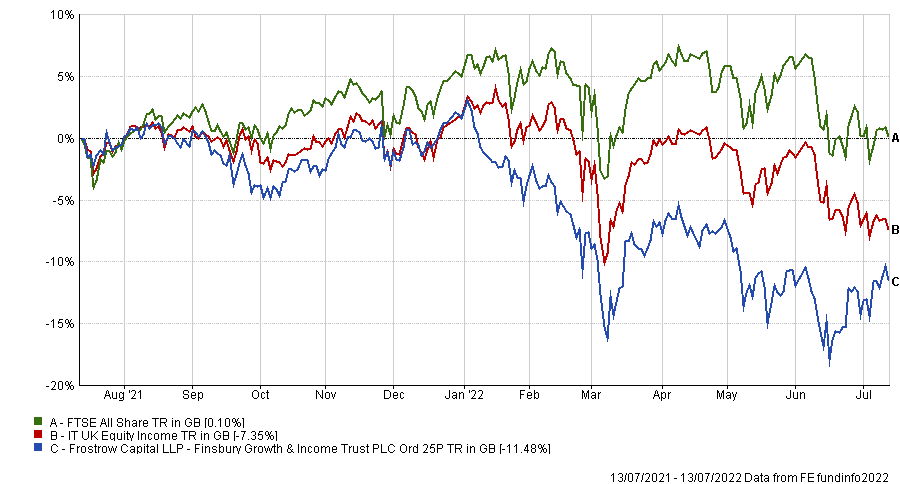Finsbury Growth & Income Trust Nick Train has apologised for the poor performance of his Finsbury Growth & Income Trust, which is down 11.5% over the past year, putting it well below its FTSE All Share benchmark and IT UK Equity Income sector.
Total return of trust vs sector and index over the past year

Source: FE Analytics
The manager had already apologised in May for his underperformance, but used the trust’s half-year factsheet to reiterate his disappointment.
“I rub my eyes in disbelief at the prices of our worst performing shares in 2022 and am sorry for the reduction in the value of shareholders’ savings that has resulted,” he said.
Among the worst performers in the second quarter were Fever-Tree, Hargreaves Lansdown and Schroders, down 30%, 22% and 17% respectively.
Train said these losses were difficult to rationalise.
“All three companies have net cash on their balance sheets (no debt), all have grown usefully since pre-Covid and all have credible business strategies that promise future growth in sales and profits.”
Diageo was another disappointment, with losses of 8.6% over the past three months. Train found this particularly perplexing, saying there are few other companies on the planet that offer greater certainty of inflation protection and access to secular real growth.
“We know that some analysts believe Diageo is expensive, because it currently commands a P/E of c25x,” he added.
“We disagree. Instead, we concur with US stock market scholar Jeremy Siegel – author of the classic Stocks for the Long Run – who concludes ‘stocks with steady growth records are worth 30, 40 and more times earnings’. On this basis Diageo is given away.”
The manager was also encouraged by the way his portfolio holdings are making the most of the digital revolution, which he said would have a far more powerful impact on wealth creation than movements in interest rates and inflation in the long term.
He singled out Experian for particular praise in this regard. In its annual report, the company announced its “Ascend Sandbox” service now helps banks and other financial institutions devise their marketing campaigns targeted at specific individuals in seven days, rather than the 60- to 90-day period it previously took.
“This sort of time saving and productivity enhancement is what makes economies and companies prosper over time,” he continued.
“Experian owns an unmatched collection of data on 1.3 billion individuals and 166 million companies worldwide; data which it can deploy to help its customers grow more quickly at less risk of default or fraud.
“It has grown its sales at a steady 6% per annum compound since it listed on the London stock market in 2006. Growth this year may slow a bit on that of 2021 but is still forecast to be above that 6% average of the last 16 years.”
Despite this encouraging forecast, Experian’s shares are down 17% over the 2nd quarter and 34% year-to-date. Train admitted the shares had got ahead of themselves in 2021, but said the weakness had given him an opportunity to buy more.
“Experian is precisely the sort of technology-advantaged company for which UK investors have been clamouring for years and this recent share price setback provides a wonderful opportunity to buy a globally significant growth company on attractive terms,” he added.
Looking ahead, Train is confident his strategy will be vindicated in the long term. He said the share price falls of many of his holdings will be temporary, and their underlying business performance will “prove the pessimists wrong and provide reasons for their shares to recover and go on, eventually, to new highs”.
“I recently calculated that companies amounting to 98% of the value of the portfolio had increased their most recent dividend,” he said.
“In addition, 70% by value had either recently paid a special dividend or were engaged in a share buyback programme, or very recently completed such a programme. It seems the companies we are invested in are financially sound and confident in their futures. We are too, whatever the stock market is saying in the short term.”





